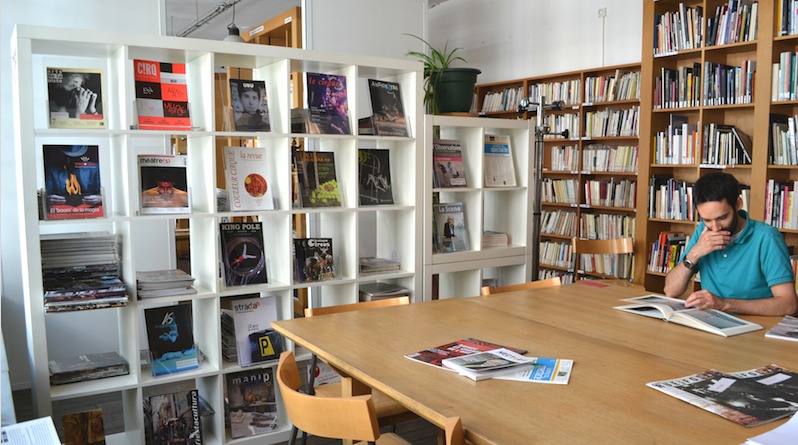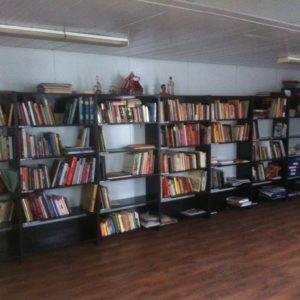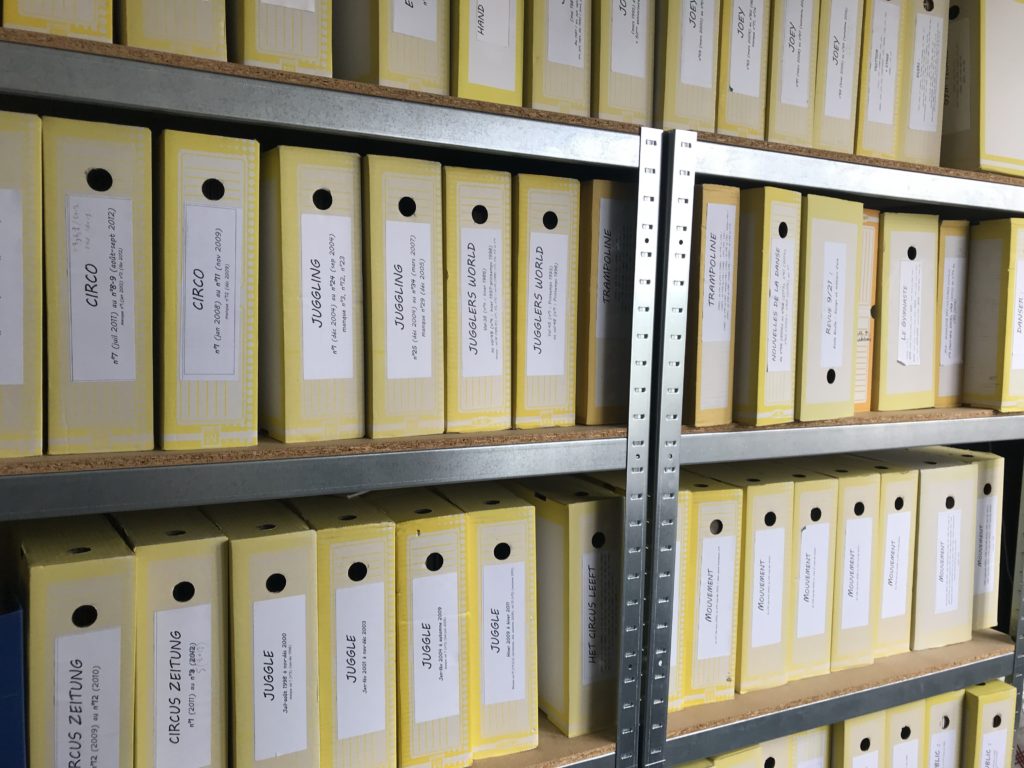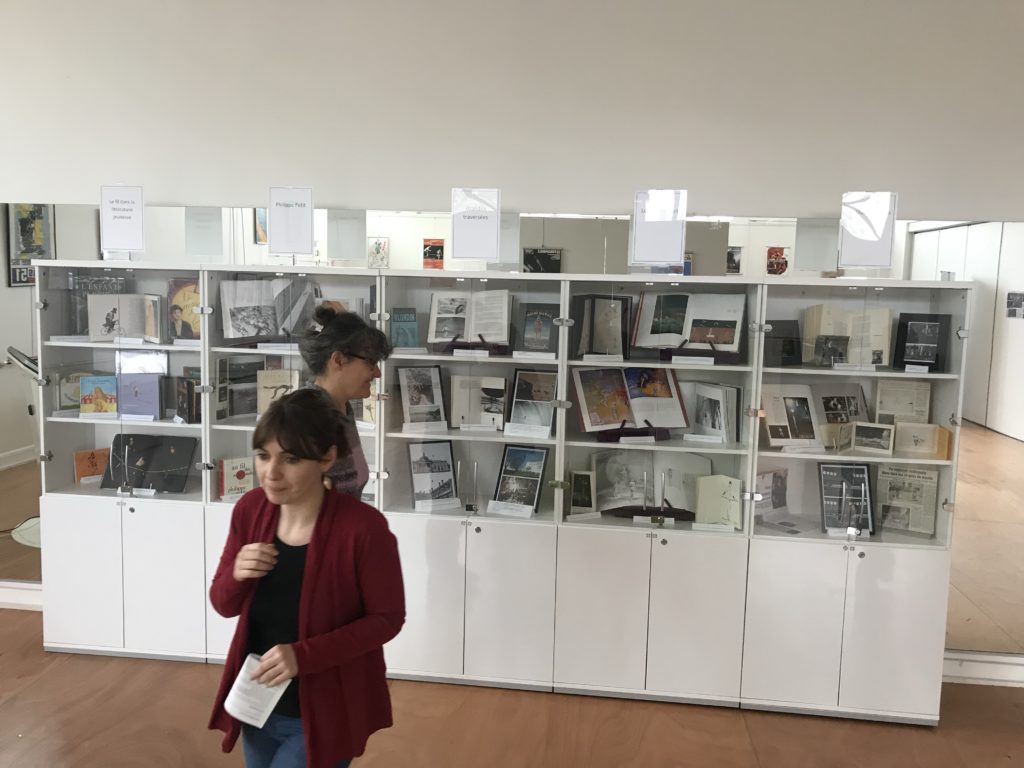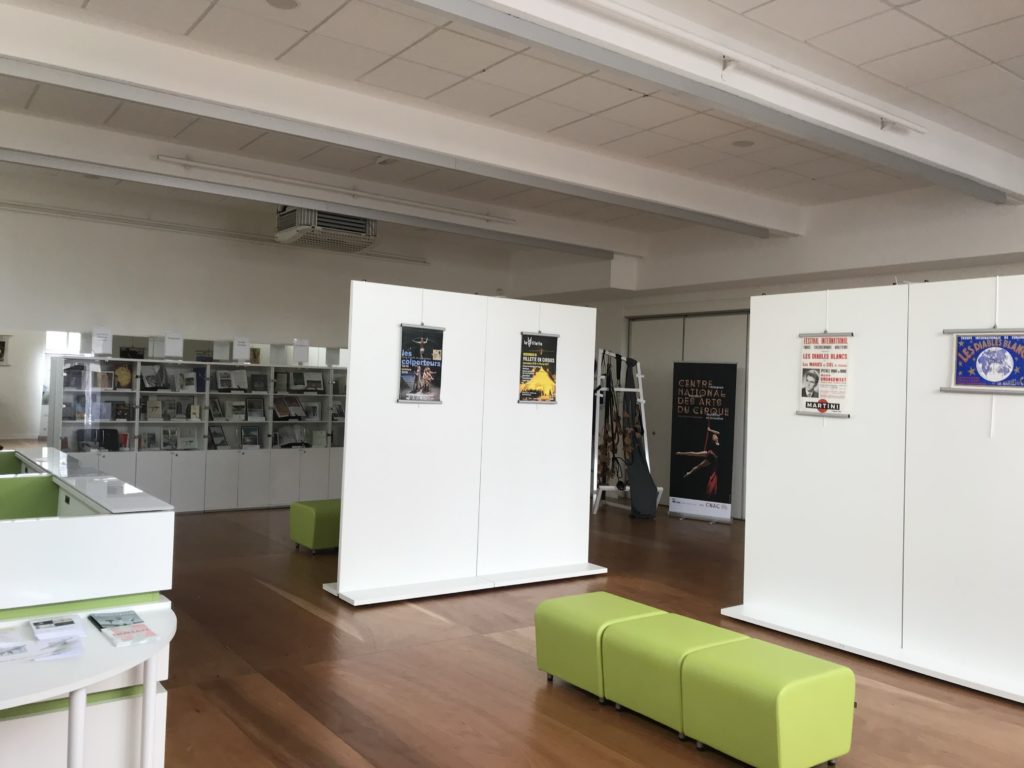Rejoice in the Circus Libraries of the World! (UPDATED)
The circus library–ideally, every circus professional has their own section of the bookshelf cordoned off for the circus classics. But having access to rare circus documents, magazines, historic photos, circus posters, and up to date tomes on circus research and trends is something most of us only dream of. Circus is especially challenged in the preserving of its ephemera due its historically mobile nature. For two hundred years, artists have been touring and leaving behind no trace except for the memories and a few flyers. It is thanks to the fans, photographers, biographers, reporters, reviewers and the academics determined to preserve developments in circus history, that we have these records at all. Many circus institutions have gone as far as to set up libraries and archives of materials to showcase and inform folks about not just how circus used to be, but how it is today.
In recent years, the professional circus school has become influential in providing circus students and visiting academics with the materials needed to research anything from historical precedent (has anyone ever juggled 10 clubs?) to methodology, to exploring multi-disciplines, and researching sports medicine for preventing injuries. But of course, circus libraries go beyond providing written or multi-media resources for their students. They also provide a respite for them, and a place of research for circademics–the new breed of circus professionals who are cropping up in universities around the world and moving the art form forward on many fronts–dramaturgically, on apparatus creation, on funding research and in science. The circus libraries that do exist are often a repository for archives donated from around the world, and a rare treasure for those who seek to understand, interact with or document the art form. So let’s take a trip around the world to visit its circus libraries!
Europe
Artcena Centre de Documentation
Paris, France
France is home to at least two circus libraries. One being at the Paris headquarters of Artcena (The French National Center for Circus, Street and Theater Arts). Their center of documentation has around 1800 books and research publications, including reference books about the history and contemporary reality of circus, street theater and art in public spaces, as well as academic publications by researchers in arts, aesthetics, history, sociology, and sports. There are around 5000 videos of performances, interviews, and documentaries on circus and street arts. The photography collection houses 8800 pictures documenting the life and history of artists, companies, theaters, and festivals, and free access to a selection of specialized reviews in the reading room.They offer reading room hours open Monday to Friday during office hours to sector professionals as well as teachers, students, researchers or journalists.
A collection of multimedia resources is available on the website exploring particular themes and concepts in artistic creation including podcasts, interviews, and video reports.
Carampa Escuela de Circo Center of Documentation
Madrid, Spain
Carampa, a circus school in Madrid, also has a documentation center that has been collecting circus material (over 500 books, 1500 DVDs, magazines, programs, recordings, posters and other circus paraphernalia) for over 30 years. The documentation center also houses a large collection of circus films and documentaries from around the world and a unique collection of Polish circus posters from 1950-1980.
The archive focuses especially on collecting brochures and videos of Carampa’s student work, and Spanish circus companies but they also collect circus paraphernalia from other European circus schools. Their book collection is in many languages and includes many rare books.
CARP (Circus Arts Research Platform)
Online resource
The collaborative brainchild of organizations such as CNAC, ENC, Circuscentrum,Circusinfo Finland, Unicamp andDOCH, CARP is neither strictly a library (brick and mortar) nor a resource center– it is rather an online platform for circus researchers whose scope goes well beyond the simple sharing of documentation of circus materials. Nevertheless, CARP offers invaluable information for any person interested in circus research or reading. The simple design and thorough presentation of materials is impressive. The website includes a global online map of libraries, archives, museums and resource centers that have circus materials. They also offer an extensive academic bibliography (with around 783 books, 607 articles and 612 thesis and dissertations available to date) a searchable database and a news source page that will keep one informed of all circus related research conferences, seminars and symposiums. Last but not least, they offer a country-by-country listing of academic databases.
CIRCa/ Pole National Cirque Auch
Auch, France
This organization, known for its programming and the CIRCa Festival, also houses documentary resources on circus arts including reference works, posters of the previous Festivals, posters of many shows, and videos of the shows performed at the last CIRCa festivals made by the audiovisual unit at CNAC (Centre National des Arts du Cirque). On their website, they also offer a list of circus networks and resources that include many archives and libraries in Europe.
CircusCentrum
Ghent, Belgium
The staff at CircusCentrum anticipates undergoing some upgrades and changes to their catalogue, which is currently in flux, but meanwhile their small library is open to the public by appointment only. They offer a small collection of circus -related books, DVD’s and videos.
CircusInfo
Helsinki, Finland
The reference library of CircusInfo Finland is located at the Helsinki headquarters. They have collected publications and books on circus arts and arts in general. The collection of circus books is around 270 publications. There are some circus magazines and a collection of press clippings from 2006–19 on Finnish contemporary circus as well as a collection of DVD’s of Finnish contemporary circus shows, with an online component as well. Head of Development, Johanna Makeala, says “It is mainly university students and journalists, or museum personnel, who use the collections when making research on circus issues.”
CircusInfo Finland has also co-published a few circus books. The latest co-publication, published in Finish by S&S is Emma Vainio’s Sirkus nyt (Circus now) which gives an updated overview on circus arts in Finland with the voice of the artists themselves.
There is a digitized larger collection of VHS circus videos and photographs that were under threat of being destroyed due to old formats. The videos stem from private collections and the major part of them are from the period around 1980–2000. The Theatre museum in Helsinki has started to collect circus related items this year, and the digitized collection will later be part of their audio-visual archives and the press clippings there.
Last year, CircusInfo Finland did a project together with the National Library of Finland to collect web content related to Finnish circus for long-term preservation. The material consists of webpages, social media pages and videos shared on the social media of 226 circus companies, individuals and organizations working with circus in Finland. The collected online material can later be accessed via the National Library’s legal deposit terminals at six legal deposit libraries in Finland.
CircusInfo Finland works with yet another memory organization that is collecting circus memories in an open form. Circus audiences, amateurs and professionals alike are invited to tell and write down their memories on circus. The texts are filed to the archives of the The Finnish Literature Society to encourage research on circus by creating materials for e.g. students of history or cultural studies to use. The memory collection is open online.
“The Circus Arts Research Platform is a valuable project as a source of information on academic research concerning circus. We see today already that young people who have practiced circus skills in the numerous youth circuses in Finland are taking up circus related issues for their MA theses in university education. Just waiting eagerly for a new generation of circus research to emerge, even in Finland.” Says Makaela. It is open to the public, but they kindly ask you to make an appointment with their personnel prior to your visit.
CIRQUEON Library
Prague,Czech Republic
This library is located in the office of CIRQUEON, the contemporary circus company/school situated in Prague. The library is open to the public and in the same building as the circus centre and hall for rehearsals, residencies and circus courses.
Library coordinator Veronika Stefanova explains the contents of the library, “The library, has a narrowly thematic focus only on circus art, is part of CIRQUEON – Centre for contemporary circus. The content of the fund includes documents (books, online publications, posters, programs, yearbooks and DVDs) that contain information about traditional and contemporary circus, both in history, theories, criticism, aesthetics and pedagogy. The library is intended for the general public and provides information services to researchers from art science, cultural journalists, students of art schools and other enthusiasts.”
Besides covering circus topics, the library also has publications that have some overlap with other artistic and social areas. There is a section of the library dedicated to the circus-themed magazines – Dance Zone, Zirkolika, Juggling Magazine, Strada, Arts de la piste, and Circus Magazine.The Documentation Fund includes programs of Czech and foreign productions and festivals, press releases and promotional materials of individual Czech and foreign ensembles of the contemporary circus. The video fund offers records of whole productions and trailers of Czech and foreign ensembles.
The online library provides documents in English and Czech. All the printed, video and online documents are to be found in the online catalogue and individual consultations are available upon request.
CNAC Resource Center
Châlons-en-Champagne, France
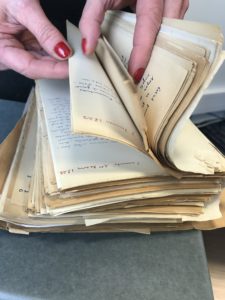
One of the world’s most complete circus libraries is in the suburb of Châlons-en-Champagne, 45 minutes outside of Paris. Tucked away in one of several circus structures in town, the library is actually dubbed a resource center because of the immense role it plays in the adjoining circus school of CNAC (Centre National des Arts du Cirque) which was founded in 1985. The modern campus is the perfect blend of old and new, featuring state of the art facilities and a polygon-shaped circus building from 1898 by Louis Gillet. The resource center houses over 9000 works, periodicals, documents and dissertations on circus traditions and contemporary circus, with 12,000 photos, numerous posters, and 2,200 videos.
The resource center was created in partnership with the Bibliothèque nationale de France and is open to the public as well as specialists. In addition to the brick and mortar library full of precious books, photos, videos and materials, there is an online database, CNAC.TV, CNAC publications, and the most recent online resource called the Circus Art Anthologies (titled Les Arts du Cirquel’encyclopedie in French), a monumental project built in collaboration with several French institutions (supported by the Ministry of Culture, the Grand Est Regional Council and the Departmental Council.) Seeking to be something of an encyclopedia of information about circus from the past to the present, their “aim is to make mostly new images and resources available to the general public, and to trace a path from the most ancient practices to particularly innovative and creative contemporary circus shows.” The website does this through the exploration of 4 axis’, acrobatics, juggling and magic, clown arts and animal training. The physical library is both a researcher’s and a circus student’s dream, providing access to so many crucial resources as it does, and curated by knowledgeable and enthusiastic staff.
Educational Documentation Center of Circus Arts
Verona, Italy
This center was established in 2003 by the ANSAC (National Association of Circus Arts Development) “to fill a historiographical gap in the field of studies on traveling shows, in order to guarantee the maintenance and development of the documentation system on circus arts.”
The CEDAC, through the collection, cataloging and digitization of documents, has about 20 collections, including that of Alessandro Cervellati. In 2011, the Federation Mondial du Cirque named the CEDAC as the only Italian structure involved in the preservation and dissemination of circus history. CEDAC periodically presents training projects for students, “with the aim of making known the organizational dynamics of a documentation center and thus stimulate new research.”
According to their website, the CEDEC library objective is to safeguard the history of the circus, in all its documentary forms, which include; programs, books, graphics, newspaper clippings, ancient and modern posters, photographs, stamps, magazines, and postcards. Some of the center’s historical posters and photographs can be viewed on theWorld Digital Library archives using the filterEducational Documentation Centre of Circus Arts (CEDAC). The Center is open to researchers.
National Fairgrounds & Circus Library
Sheffield, UK
Since 1994, National Fairgrounds & Circus Library has housed an impressive collection in the West Bank Library at the University of Sheffield in England. It is largely photographic, manuscript and audiovisual records on all aspects of the lives of traveling show people and fairgrounds. There is a free digital resource for the public, housing dozens of collections (categorized and searchable by the name of the donor) that is constantly growing (visible at the ‘recent additions’ sidebar) Although users may share the images, there is a user tools and guides page to explain how to properly credit the archive.
Zirkusarchiv Winkler
Berlin, Germany
This private archivein Berlin has existed for more than 50 years and works to protect and preserve documents related to circus history, magic, variety arts and showmanship. Their aim is to preserve the tradition of circus arts and make it accessible to researchers. The archive offers: research, provisions of materials for exhibitions, selection of photos for publications, advice for students, journalists and scientists and information on current literature on the subject. Materials include about 9200 books, 2000 circus magazines from 20 countries, 12,000 circus programs from 50 countries, 18,000 photographs, newspaper clippings, videos, a variety of souvenirs and toys and also 150 original graphic art with circus motifs. The archive is free and open to the public by appointment. Gisela and Dietmar Winkler have already published more than 20 books about circus history.
The Americas
ENC Library (Ecole national de cirque)
Montreal, Quebec, Canada
Behind every good library is a great librarian. A well-loved circus library on the American continent is the ENC library located on the campus of the Canadian national circus school, and headed up by Anna-Karyna Barlati, renown for her circus knowledge and willingness to help locate materials for research projects. Since 2004, this formidable library has been open to the public, and when you take a break from researching your dissertation you need only look up for inspiration, as the gym is visible from the glass wall of the library. The library houses over22,000 items,including important collectionsof books, master’s and doctoral theses, DVDs, rare and antique books, periodicals, performance and festival programs, documentary files on artists and companies, posters, post cards, photographs and soundtracks.The library offersover 2000 digital documents available free online (journal articles, books, theses, interview, etc.) on a variety of circus arts-related topics. The library also houses the exceptionalPascal Jacob Collection of over 5,000 rare and ancient documents related to circus arts.
Milner Library, Illinois State University in Normal, IL
Illinois, USA
A secret midwest resource, Illinois State University houses the Milner Library, and in that library is the Circus & Allied Arts Collection, one of the largest collections of its kind with a special focus on circus, related arts such as carnivals, sideshows, carousels, conjuring, music halls, and vaudeville. They offer 8000 books to peruse as well as a formidable archive of “photographs, circus posters, programs, route books, correspondence, business records, band scores, assorted media, and realia.” They also offer online browsable databases such as the Passion for Circus Digitial Collection, the Circus Magazine Database from Ringling Brothers and Barnum & Bailey Circus Magazines.
Nautilus, the Mobile Circus Library Circomente
Mexico City, Mexico
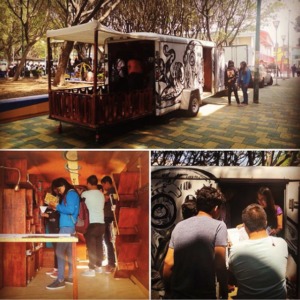
Nautilus, the mobile circus library, is part of Dokucirco: The Mexican Centre of Circus Documentation, supported by Cirko De Mente A.C. Rodrigo Hernandez reports that due to government cutbacks, operational support for Nautilus has been affected, “This year has been very hard for the project. We are now restructuring the organization and finding new ways to continue with our activities. Government economic support has historically been scarce in Mexico, nevertheless Cirko de Mente managed to hold a grant for a few years, which allowed the development of such things as the professional circus school, the documentation centre and the mobile circus library. Unfortunately, the project doesn’t hold the grant any more, so there is no longer money to sustain the team that makes this project exist nor to pay the salaries of the professors. In order to face this adversity, we are now restructuring into a Cooperative–which might not only prevent the project from stopping, but even lead to a stronger organization,” he explains.
“In the meantime, the students at Cirko de Mente continue with their regular classes and are able to visit Nautilus every time they want to, but for the rest of the people, the library only opens a few times per month.”
It’s intended to be a spot for conservation, consultation, reflection, production and dissemination of information, and supplies books, magazines, programs and movies regarding circus arts. When it’s not visiting schools or circus festivals, you can visit Nautilus at Cirko De Mente in Mexico City, just send and e-mail or call by phone before you go. Learn more about this project by visiting the webpage.
Addendum
Since publication, several circus based libraries and archives have been brought to our attention, including those listed below. If you know of any circus-themed archives and libraries not mentioned in this article, please email the editor with the link and any information you can supply.
The Raffaele De Ritis Collection and Library of Performing Arts
Pescara, Italy
Started as an hobby in the early 70s and housed in Pescara, Italy, the private Raffaele De Ritis Collection and Library on Performing Arts houses about 10000 documents (books, posters, prints, films, programs) concerning live entertainment thorough the ages, with a focus on circus and variety arts. Subjects include circus, clown, magic, mime, Commedia dell’Arte, pantomime , puppetry, variety, music-hall, strip-tease, sideshows, comedy cinema; and side entertainment with obscure branches on gambling, scams and cocktail art. It includes classics of the world circus literature from the origins, including a rare section of Soviet books. International circus history is also documented with about 1000 playbills and posters. The collection is truly multi media and includes, videos, circus-themed movies and documentaries and just one small facet of the life work of Raffaele De Ritis himself.
Public showings are often part of the exclusive educational program Astley’s Place, and it is otherwise accessible by appointment for scholars and researchers.
The Ringling Circus Museum, Archives and Library
Sarasota, Florida
Founded in 1948, The Ringling Circus Museum was the first in America to document the rich history of this phenomenally popular entertainment. As the site of the Ringling Bros. and Barnum & Bailey Winter Quarters from 1927 until 1960, Sarasota became the home of many extraordinary performers and show people. Through their generosity, the collection of wardrobe, memorabilia, and ephemera has grown steadily. The circus community frequently participates in Museum programming and assists with projects to document the collections.
The museum archives, housed in the Tibbals Circus Education Center include an extraordinary wealth of materials documenting the international history of the circus business and the even longer histories of the various circus arts. Circus publications like programs, route books and souvenir booklets are supplemented by rich collections of photographs, prints, costume design drawings, and newspaper clippings dating back to the early 18th century. The Archives collects primary and secondary published material including books and serials, magazines and trade journals that document the circus, Wild West shows, and allied arts, as well as broader topics that shed light on these entertainment operations.
The Museum Library holds 2,228 books in the Circus collection as well as many additional titles that relate to the circus and allied arts. The Library also maintains subscriptions to a number of circus periodicals. The Library’s holdings can be accessed through the Library’s online catalogue on The Ringling’s website.
A By No Means Complete Resource List of Other Online Archives That House Circus Documents
Arts Centre Melbourne-The Circus Collection Australia
The Billy Rose Theatre Collection (USA)
Drottningholms Teatermuseum (Sweden)
The Free Library of Philadelphia - Theatre Collection (USA)
Ghent University (Netherlands)Huis Van Allijn (Belgium)
Harvard Theatre Collection (USA)
Library of Grand Auch (France)PALM San Francisco Performing Arts Library & Museum (USA)
The Raymond Mander and Joe Mitchenson Theatre Collection(UK)
Theater Arts Collection at the Ranson Center, University of Texas(USA)
Theatre Museum (UK)
Feature photo of Artcena, courtesy of Artcena, Photo credit: Emma Péquin
...Do you have a story to share? Submit your news story, article or press release.

